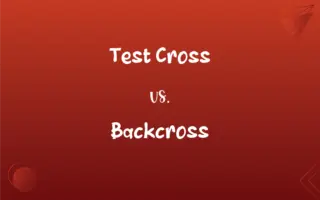Spinster vs. Bachelor: What's the Difference?
Edited by Aimie Carlson || By Janet White || Updated on October 2, 2023
"Spinster" traditionally refers to an unmarried woman, often implying advanced age; "Bachelor" refers to an unmarried man, without implying age.

Key Differences
The terms "Spinster" and "Bachelor" have been traditionally used to describe unmarried women and men, respectively. "Spinster" often carried a connotation of an older, unmarried woman, possibly one who had chosen to remain single or who had missed the opportunity to marry. On the contrary, "Bachelor" refers to an unmarried man, typically without carrying implications regarding age or the reason for being unmarried. The term "Bachelor" has remained a relatively neutral and commonly used term, while "Spinster" has become outdated and can be considered derogatory due to its negative connotations.
Delving deeper, "Spinster" has historical connotations where it was linked with the idea of a woman being past the usual age for marriage, often with the implication that she is unlikely to marry. It often inferred a sense of incompleteness or a deviation from the societal norm. Conversely, "Bachelor" is more neutral and can describe any man who has never been married, regardless of his age or whether he has chosen to remain single. It does not inherently imply a deviation from societal norms or an expectation that the individual should marry.
In contemporary usage, the term "Spinster" is rarely used due to its potentially offensive implications. Instead, terms like 'single woman' are more commonly and neutrally used to describe unmarried women. In contrast, "Bachelor" continues to be a commonly used term to describe unmarried men and does not inherently carry negative or positive connotations. "Bachelor" can imply independence and freedom and is often used without any judgment or implication about an individual’s marital status.
In social contexts, "Spinster" and "Bachelor" are indicative of societal norms and expectations around marital status, reflecting societal attitudes towards unmarried individuals. "Spinster" reflects a historically judgemental perspective towards unmarried women, emphasizing a perceived lack or absence. In contrast, "Bachelor" generally denotes an unmarried status without the judgmental undertones, making it a more neutral term in discussions about marital status and societal expectations.
Comparison Chart
Meaning
Refers to an older, unmarried woman
Refers to an unmarried man, regardless of age
ADVERTISEMENT
Connotation
Often negative, implying being past usual marriage age with no prospect
Generally neutral, without implying reason for being unmarried
Usage
Outdated and considered derogatory
Common and accepted
Gender
Female
Male
Implication
Implies deviation from societal norms
Does not inherently imply deviation from societal norms
Spinster and Bachelor Definitions
Spinster
A term, now considered derogatory, for a woman still unmarried and beyond the usual age of marriage.
The term spinster is outdated and can be offensive.
ADVERTISEMENT
Bachelor
An unmarried man.
He is a happy bachelor, enjoying his single life.
Spinster
An older unmarried woman.
The village spinster lived a quiet and solitary life.
Bachelor
A man who has not and may never marry.
The bachelor had no intention of giving up his freedom.
Spinster
Historically, a woman who spins, used to denote unmarried women.
The spinster in the town was known for her excellent weaving skills.
Bachelor
A young knight serving under another’s banner in the old feudal days.
The young bachelor was eager to prove his valor.
Spinster
A woman who remains single beyond the conventional age for marrying.
She is a spinster by choice, focusing on her career.
Bachelor
A man who leads a single lifestyle, often enjoying independent and social activities.
The bachelor enjoyed his traveling adventures.
Spinster
A term used to describe a woman who seems unlikely to marry.
She embraced her spinster status, enjoying her independence.
Bachelor
A person who has earned a degree from a college, university, or some other educational institution (Bachelor’s degree).
He is a Bachelor of Arts in English Literature.
Spinster
Often Offensive A woman, especially an older one, who has not married.
Bachelor
A man who is not married.
Spinster
(Archaic) A person, especially a woman, whose occupation is spinning thread.
Bachelor
A man who has never been married.
Spinster
A woman who has never been married, especially one past the typical marrying age according to social traditions.
Bachelor
A man who is not married and is not involved in a serious romantic relationship.
Spinster
One who spins (puts a spin on) a political media story so as to give something a favorable or advantageous appearance; a spin doctor, spin merchant or spinmeister.
Bachelor
A person who has completed the undergraduate curriculum of a college or university and holds a bachelor's degree.
Spinster
(obsolete) Someone whose occupation was spinning thread.
Bachelor
A male animal that does not mate during the breeding season.
Spinster
(obsolete) A woman of evil life and character; so called from being forced to spin in a house of correction.
Bachelor
A young knight in the service of another knight in feudal times.
Spinster
A spider; an insect (such as a silkworm) which spins thread.
Bachelor
A person, especially a man, who is socially regarded as able to marry, but has not yet.
Spinster
A woman who spins, or whose occupation is to spin.
She spake to spinster to spin it out.
The spinsters and the knitters in the sun.
Bachelor
The first or lowest academical degree conferred by universities and colleges; a bachelor's degree.
Spinster
A man who spins.
Bachelor
Someone who has achieved a bachelor's degree.
Spinster
An unmarried or single woman; - used in legal proceedings as a title, or addition to the surname.
If a gentlewoman be termed a spinster, she may abate the writ.
Bachelor
(Canada) A bachelor apartment.
Spinster
A woman of evil life and character; - so called from being forced to spin in a house of correction.
Bachelor
(obsolete) An unmarried woman.
Spinster
An elderly unmarried woman
Bachelor
(obsolete) A knight who had no standard of his own, but fought under the standard of another in the field.
Spinster
Someone who spins (who twists fibers into threads)
Bachelor
(obsolete) Among London tradesmen, a junior member not yet admitted to wear the livery.
Bachelor
A kind of bass, an edible freshwater fish (Pomoxis annularis) of the southern United States.
Bachelor
A man of any age who has not been married.
As merry and mellow an old bachelor as ever followed a hound.
Bachelor
An unmarried woman.
Bachelor
A person who has taken the first or lowest degree in the liberal arts, or in some branch of science, at a college or university; as, a bachelor of arts.
Bachelor
A knight who had no standard of his own, but fought under the standard of another in the field; often, a young knight.
Bachelor
In the companies of London tradesmen, one not yet admitted to wear the livery; a junior member.
Bachelor
A kind of bass, an edible fresh-water fish (Pomoxys annularis) of the southern United States.
Bachelor
A man who has never been married
Bachelor
A knight of the lowest order; could display only a pennon
Bachelor
Lead a bachelor's existence
FAQs
Is ‘bachelor’ neutral in connotation?
Yes, ‘bachelor’ is generally considered a neutral term to describe an unmarried man.
Can ‘spinster’ be used to describe a young, unmarried woman?
Traditionally, ‘spinster’ implies an older, unmarried woman, and using it for a young woman would be unconventional.
Why is ‘spinster’ considered offensive?
‘Spinster’ is considered offensive as it often implies a woman is unmarried due to being undesirable or failing to secure a spouse.
Is a ‘bachelor pad’ a term for a single man’s residence?
Yes, ‘bachelor pad’ is a colloquial term for a single man's residence, often implying a focus on style, convenience, and entertainment.
Is ‘spinster’ a derogatory term?
Yes, ‘spinster’ is considered derogatory and outdated due to its negative connotations about unmarried women.
Is ‘spinster’ used in legal contexts?
Historically, ‘spinster’ was used in legal documents to denote unmarried women, but this usage is obsolete.
Can ‘bachelor’ refer to a degree holder?
Yes, ‘bachelor’ can also refer to an individual holding a bachelor's degree.
Is ‘bachelor’ exclusive to men?
Traditionally, yes. ‘Bachelor’ typically describes unmarried men, whereas ‘bachelorette’ is used for unmarried women.
Does ‘spinster’ imply a certain lifestyle?
Historically, ‘spinster’ might imply a solitary or unconventional lifestyle, but any such implication is based on stereotype.
Does ‘bachelor’ imply freedom and independence?
‘Bachelor’ often implies a degree of freedom and independence associated with being unmarried.
Can ‘bachelor’ describe a young, unmarried man?
Yes, ‘bachelor’ can describe any unmarried man, regardless of age.
Is ‘spinster’ still in common usage?
No, the term ‘spinster’ is largely outdated and replaced with terms like ‘single woman.’
Can a ‘bachelor’ be someone who prefers being single?
Yes, a ‘bachelor’ can be someone who prefers the single life and has chosen not to marry.
Did ‘spinster’ originally denote a woman who spins?
Yes, historically, ‘spinster’ denoted a woman who spins, especially one who was unmarried.
Is the term ‘spinster’ being redefined in modern times?
Some attempt to redefine ‘spinster’ to reflect empowerment and choice, but it is largely outdated.
Can ‘spinster’ denote independence?
While often used negatively, ‘spinster’ can be reclaimed to positively denote independence and self-sufficiency.
Does ‘spinster’ imply a lack of romantic relationships?
‘Spinster’ may unfairly imply a lack of romantic relationships or undesirability, based on stereotypes.
Can the term ‘bachelor’ imply a casual approach to relationships?
Sometimes, ‘bachelor’ might imply a casual or non-committal approach to relationships, but this is based on individual interpretation and stereotype.
Is ‘bachelor’ used colloquially?
Yes, ‘bachelor’ is commonly used colloquially to describe unmarried men and their lifestyles.
Can ‘bachelor’ denote a sense of incompleteness?
Generally, ‘bachelor’ does not inherently denote incompleteness or a lack of fulfillment.
About Author
Written by
Janet WhiteJanet White has been an esteemed writer and blogger for Difference Wiki. Holding a Master's degree in Science and Medical Journalism from the prestigious Boston University, she has consistently demonstrated her expertise and passion for her field. When she's not immersed in her work, Janet relishes her time exercising, delving into a good book, and cherishing moments with friends and family.
Edited by
Aimie CarlsonAimie Carlson, holding a master's degree in English literature, is a fervent English language enthusiast. She lends her writing talents to Difference Wiki, a prominent website that specializes in comparisons, offering readers insightful analyses that both captivate and inform.































































